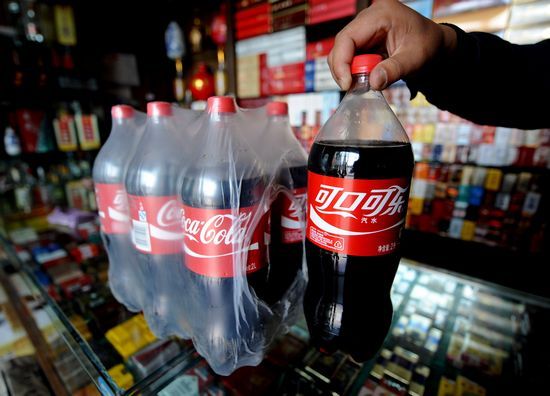Coca Cola sorry over handling of drinks scare
 0 Comment(s)
0 Comment(s) Print
Print E-mail China Daily, May 5, 2012
E-mail China Daily, May 5, 2012
 |
| Coca-Cola Shanxi Beverages Co Ltd admitted that some of its products were contaminated by chlorine in February. [Xinhua] |
The Coca Cola Co apologized on Friday for the way it has dealt with a scandal that arose after some of its drinks were alleged to be contaminated with chlorine.
In response to the accusations, the company temporarily halted production at its bottling plant in Shanxi province on April 28. Shortly before that, the provincial food-safety watchdog had conducted an inspection of that site and confirmed earlier media reports which alleged that drinks produced from Feb 4 to Feb 8 there were made with water containing unusually large amounts of chlorine.
Of the 120,000 boxes of drinks, 76,391 were distributed in Shanxi. David G. Brooks, president of the US beverage giant's China and South Korea branches, said customers and distributors who have the drinks in their possession, or even bottles that had contained a contaminated beverage, can call the company to have them replaced or get their money returned. His remarks came at a news conference held on Friday in Taiyuan, capital of Shanxi province.
He said products returned from those batches will be destroyed under the close supervision of the Shanxi Bureau of Quality Supervision and Inspection.
Brooks said the general manager of the company's Shanxi branch had stepped down and a successor has been appointed to oversee the steps the company must take to resume production in the province, which will only occur after it has received approval from the Shanxi food-safety regulator.
The company continued to say the drinks in question are safe for human consumption. It said its offer to replace them was not a product recall but was meant to keep customers' trust.
Brooks said the company's apology was necessary because it had not responded quickly enough to the scandal and had issued inconsistent statements as the case developed.
"Although we believe the products have no problem and people's worries are ungrounded, we want to take these steps to reassure those who are concerned," he said.
"This is not the best moment for Coca Cola in its 126 years' history, but the incident in Shanxi is an isolated case," Brooks said, adding that it will not affect Coca Cola's reputation and business in China.
The company plans to invest $4 billion in China from 2012 to 2014 and open a plant in Shijiazhuang, capital of North China's Hebei province.
Su Yan, a member of the board of directors of the company's Shanxi branch, said the company took time to investigate and verify what had really happened in the case. That's why, he explained, the company changed its course from first denying media reports that said Coca Cola drinks contained unusually high amounts of chlorine to agreeing to replace the products.
The company angered many people when it issued a notice on its Sina Weibo micro blog on April 2 offering to replace the products in question but not to provide reimbursements to those who had bought them.
A whistleblower in the Shanxi factory was the first person to allege to media outlets that drinks made there had been tainted with chlorine. When asked by reporters at the Friday news conference if the employee had been punished, Su said he had no knowledge of there being a whistleblower inside the company.
Sun Wei, Coca Cola's legal advisor in China, said the contamination occurred in February, when water containing small amounts of chlorine used to clean bottles was mixed with water that ultimately went into beverages.
Sun said the affected batches only contained trace amounts of chlorine, less than the 0.005 milligrams per liter allowed by China's national standard for purified water.
Chlorine is commonly used to kill bacteria but can be hazardous in large amounts.
Liu Wenjun, director of Tsinghua University's institute for drinking-water safety, said Chinese standards say tap water should contain no more than 4 milligrams of chlorine per liter.






Go to Forum >>0 Comment(s)